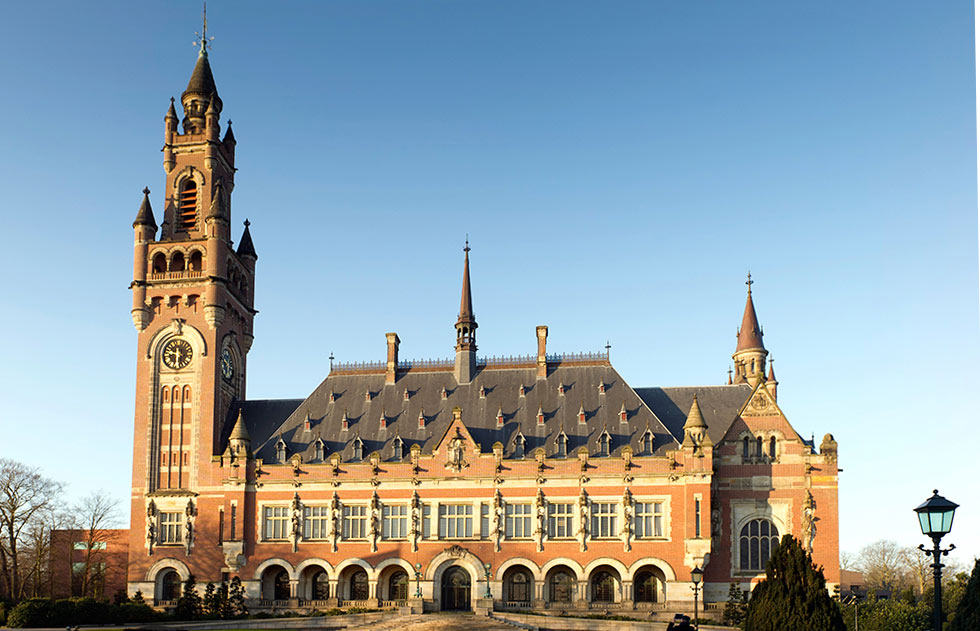The International Court of Justice (ICJ) will rule on December 18 whether it has jurisdiction to take up Guyana’s quest for a juridical ruling on the 1899 arbitral award which settled this country’s boundary with Venezuela.
Guyana’s recourse to the ICJ came earlier this year after decades of stalemate in its border controversy with Venezuela.
A release yesterday from the ICJ said that a public sitting of the Court will take place at 3 p.m. on December 18 at the Peace Palace in The Hague, during which the President of the ICJ, Judge Abdulqawi Ahmed Yusuf, will read out the Court’s decision.
It said that In view of the current COVID-19 pandemic, only Members of the Court and representatives of the Parties will be present in the Great Hall of Justice. Members of the diplomatic corps, the media and public will be able to follow the reading through a live webcast on the Court’s website, as well as on UN Web TV, it said.
Venezuela did not take part in the proceedings. If the ICJ, also known as the World Court, finds that it has jurisdiction it will proceed to hear Guyana’s substantive case.
On June 30 this year, Sir Shridath Ramphal with support from several international lawyers argued before the World Court that it has the jurisdiction to decide that the Paris Award which settled the boundary between Guyana and Venezuela is binding.
In his presentation to the Court, Ramphal maintained that a juridical settlement of this matter is the only recourse remaining as Guyana has exhausted all other measures including those provided for in the 1966 Geneva Agreement.
He noted that Agreement grants the Secretary General (SG) of the United Nations the right where other means of resolution have failed from a list in Section 36 of the Agreement.
The Secretary General, Ramphal stressed, has selected this Court.
Guyana’s case is based in the plain text of the Geneva Agreement by which the parties expressly consented to accept the decision of the SG on the means of resolution of their dispute over the validity of the 1899 award…and that the dispute be settled by the International Court of Justice if that be the means selected by the SG,” he reminded.
In its Application of March 29 before the ICJ, Guyana requested that the Court adjudge and declare that:
“(a) The 1899 Award is valid and binding upon Guyana and Venezuela, and the boundary established by that Award and the 1905 Agreement is valid and binding upon Guyana and Venezuela;
(b) Guyana enjoys full sovereignty over the territory between the Essequibo River and the boundary established by the 1899 Award and the 1905 Agreement, and Venezuela enjoys full sovereignty over the territory west of that boundary; Guyana and Venezuela are under an obligation to fully respect each other’s sovereignty and territorial integrity in accordance with the boundary established by the 1899 Award and the 1905 Agreement;
(c) Venezuela shall immediately withdraw from and cease its occupation of the eastern half of the Island of Ankoko, and each and every other territory which is recognized as Guyana’s sovereign territory in accordance with the 1899 Award and 1905 Agreement;
(d) Venezuela shall refrain from threatening or using force against any person and/or company licensed by Guyana or engage in economic or commercial activity in Guyanese territory as determined by the 1899 Award and 1905 Agreement, or in any maritime areas appurtenant to such territory over which Guyana has sovereignty or exercises sovereign rights, and shall not interfere with any Guyanese or Guyanese-authorised activities in those areas;
(e) Venezuela is internationally responsible for violations of Guyana’s sovereignty and sovereign rights, and for all injuries suffered by Guyana as a consequence.”
On January 30th this year, United Nations Secretary-General, António Guterres recommended that the Guyana/Venezuela border controversy be referred to the ICJ which is also known as the World Court.
Following a request by Guyana for juridical settlement, former UN Secretary General Ban Ki-moon on December 15, 2016 had given the good offices process between the two countries one additional year – 2017 – for talks at settling the controversy and if there was no substantial progress the matter would then be sent to the ICJ. There was no progress. When it filed its case on March 29 at the ICJ, Guyana said that the UN Secretary-General’s authority to choose the ICJ as a means of resolving the controversy is based on the Geneva Agreement of 1966 which was negotiated just before Guyana gained independence.






